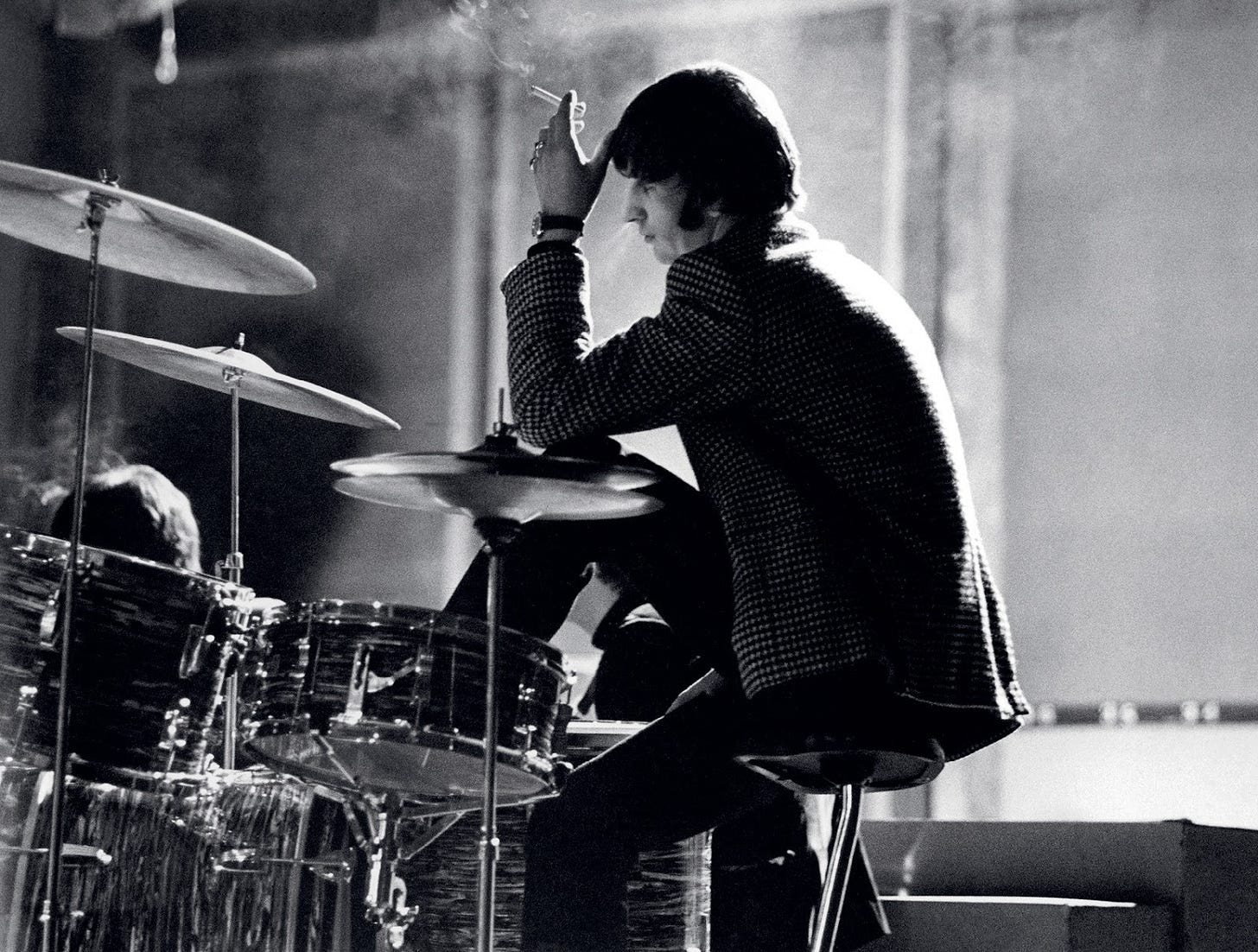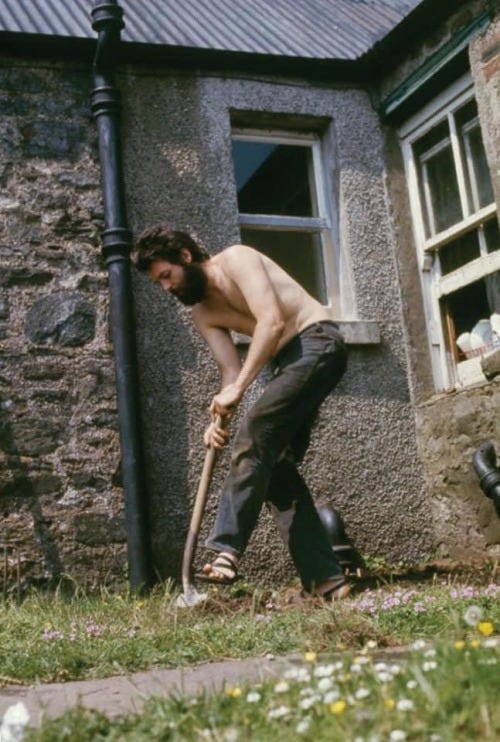Unscrambling "Yesterday"
The hidden mystery of Paul McCartney's most iconic song
“I don’t really want to make too much of it, except to say that I think songs have a way of talking into the future.” — Nick Cave
It’s June 14, 1965 at EMI Studios and it's been a day already, for Paul McCartney.
The band began by recording his folk rock “I’ve Just Seen a Face,” followed by his Little Richard-inspired screamer “I’m Down.” Next, producer George Martin positions a chair and a single microphone in the centre of the room and dims the lights. While his bandmates watch from the control room, Paul seats himself and tunes his acoustic guitar.
Less than three minutes later, the 22-year-old enigmatic chain-smoking musical prodigy has recorded what we now generally agree is a masterpiece, and what will become one of history’s most iconic songs.
"Yesterday" comes into the world in a dream. We know this of course, but like all origin stories, it’s a story created to be retold. Paul wakes up in the attic... in the garret, for chrissake... of the Asher’s London townhouse, with a melody in his head. Still half-asleep, he stumbles to the piano to capture it before it slips away. He's not as excited as you’d think, though. Since he’d never dreamed a complete melody before, he assumes he’s remembered it rather than composed it. He gives it the temporary title “Scrambled Eggs,” and spends the next year and a half playing it for anyone who will listen until he’s convinced by consensus and collective exasperation that it is indeed his.
When Paul finally accepts authorship and brings “Yesterday” into the studio, none of the other three can think of anything to add to it. It’s evident to all concerned that “Yesterday” isn’t a Beatles song. It's not even a Lennon/McCartney song. It’s a Paul McCartney song in which there is no room for anyone but Paul McCartney.1 This is a fraught moment for a band that hasn’t yet recorded anything that all four of them didn’t contribute to, and even more so for a band that has defied the pop formula by not having a single frontman and whose complex dynamic depends on maintaining (the illusion of) equality. Mostly though, this is a fraught moment for John Lennon and we'll get to John and his struggles with all of this in a moment.
George Martin, who has a classical background, suggests adding a string quartet, thus transforming the song from Tin Pan Alley into something closer to chamber music. On a pop record. For teenagers. In 1965. (This is a good moment to pause and thank whatever god you happen to believe in for the failed Decca audition.)
The string quartet suggestion is initially rejected by Paul, and presumably by the other three, assuming they’re given a say. String quartets are exactly what they don’t want. They’re wearing their tailored suits of respectability, but musically the Fabs are still on the trailing edge of their Hamburg black leather period. The track that follows “Yesterday” on the album will be John’s cover of the 1958 rocker "Dizzy Miss Lizzy.”.
But George Martin persists... gently, because creative genius requires careful handling and by now, he’s starting to suspect genius is what he’s dealing with. “Let’s try it. If you don’t like it, we won’t use it,” he promises a skittish Paul.
Paul is skittish, and yet it’s no accident that the string quartet idea is unfolding for the first time with one of his songs.
"Yesterday" only happens — and really, The Beatles only happen — because of Paul’s stubborn refusal to abandon the music of his childhood. Music hall, yes, but more broadly, the Great American Songbook of Porter and Gershwin and Berlin. Without Paul’s “granny music” influences, we don’t get “Eleanor Rigby” and “A Day In The Life” and “Michelle” and "Penny Lane" and “She’s Leaving Home” and for that matter, “In My Life” and “Strawberry Fields Forever”. And we certainly don’t get "Yesterday”. Without the Great American Songbook, The Beatles are still the world’s best bar band, which is no small thing but it’s not The Beatles, either.
This is not, to be clear, another bogus “Paul brought the sweetness and John brought the bite” story. Remember, Paul's savage proto-metalpunk lead vocal for "I'm Down" is still smoldering on the control room deck. Remember, John’s delicate acoustic ballad “It’s Only Love” will be on the album, too. Nothing about Lennon/McCartney is ever that easy or that sharply defined, which is yet another reason why ‘John vs. Paul’ and all its attendant bullshit is a '70s relic that should have died along with avocado green refrigerators and the Columbia House Record Club scam.
What the story of “Yesterday” is, though, is a story of the mutual creative insanity insecurity that to this day lurks at the beating heart of Lennon/McCartney. Fab psychoanalysis is always a dicey business, but it seems to go more or less like this—
As geniuses often are, John is deeply insecure about... well, everything, actually but mostly his talent, especially relative to Paul’s (tbf, this club contains multitudes, John is just the charter member). This insecurity compels John to undermine Paul’s work, usually passively-aggressively but occasionally overtly. Since John is Paul’s self-proclaimed biggest influence, John’s undermining does indeed cause Paul to doubt his own talent. And since Paul’s insecurity manifests itself in his extreme work ethic, Paul responds by working even harder to impress John. This makes John even more insecure, which ratchets the whole cycle up to the next level where it starts all over again.
This mutual need to create primarily for each other is the tug-of-war partly responsible for the creation of probably the most influential and transformative music ever recorded. It’s also the toxic spiral that, while it’s obviously more complicated than this, forms the fault line that underlies the eventual implosion of Lennon/McCartney.
This cycle of insecurity has been festering since the day they met at the Fete, when Paul made such an impression that John was worried about letting him in the band for fear Paul would take over even as John knew he needed Paul if the band was going to go anywhere. “Yesterday” is the first significant public surfacing of this cycle.
George Martin suggests to Brian Epstein that “Yesterday” be released as a Paul McCartney single, rather than a Beatles song. George Martin is a brilliant producer but his skill as a genius-minder fails him in this moment. He's just said a quiet thing out loud and much of the power of The Beatles in 1965 comes from not saying the quiet things out loud. (I’d be interested in knowing whether George Martin shared his suggestion with Paul.)
Brian has his faults as a manager, but he understands the sensitive dynamics at play. “No," he responds. "Whatever we do, we are not splitting up the Beatles."
He's not exaggerating. If “Yesterday” is released as a Paul McCartney single, the band instantly becomes Paul McCartney & the Beatles and it all comes crashing down. John’s obviously and rightly not going to put up with the Beatles being a backup band for Paul. Neither is George, but that’s another psychodrama for another day.
The official story goes that all four Beatles don’t want “Yesterday” released as a single, specifically in the UK, because it’s off-brand for their rock and roll vibe. Maybe that’s true, but I have a hard time believing Paul completely shares this perspective because—
Oddly, for a song the band doesn’t want to call attention to in the UK, the first time Paul performs “Yesterday” live is on the variety show Blackpool Night Out, broadcast only in... the UK. 🤔 This is also the first time a Beatle will perform solo onstage and there is no way this isn’t going to trigger a supercharged round of the Lennon/McCartney cycle of insecurity.
Sure enough, at rehearsal, John heckles Paul from the wings, reportedly calling out, “Thank you, Paul, that was bloody crap!” as Paul finishes the song. Their subsequent argument is caught on film by the fan club photographer and published as a “boys will be boys” photo essay in the next issue of the Beatles magazine for the kiddies to enjoy.
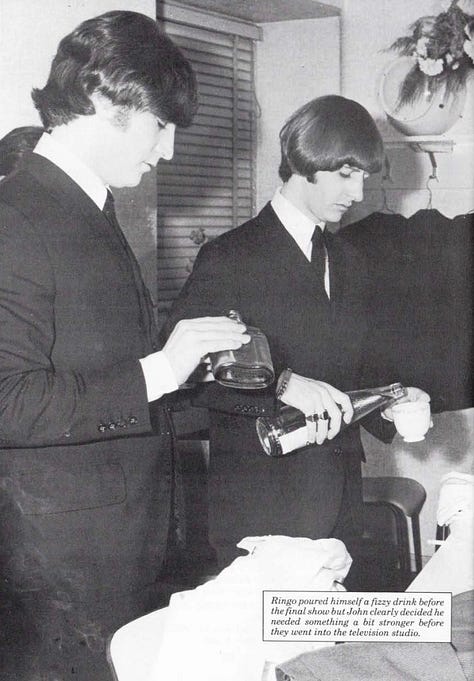
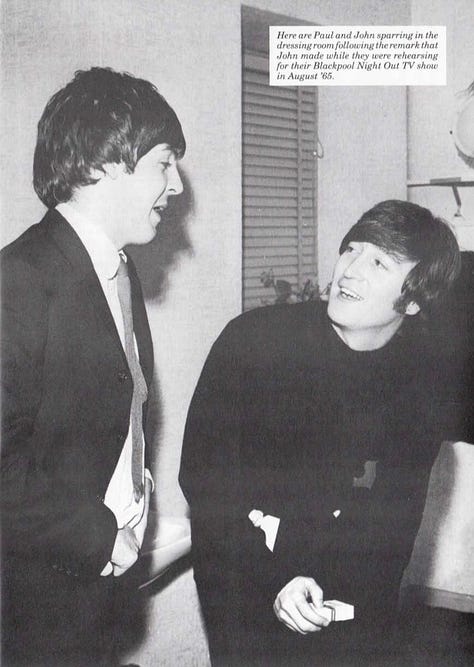


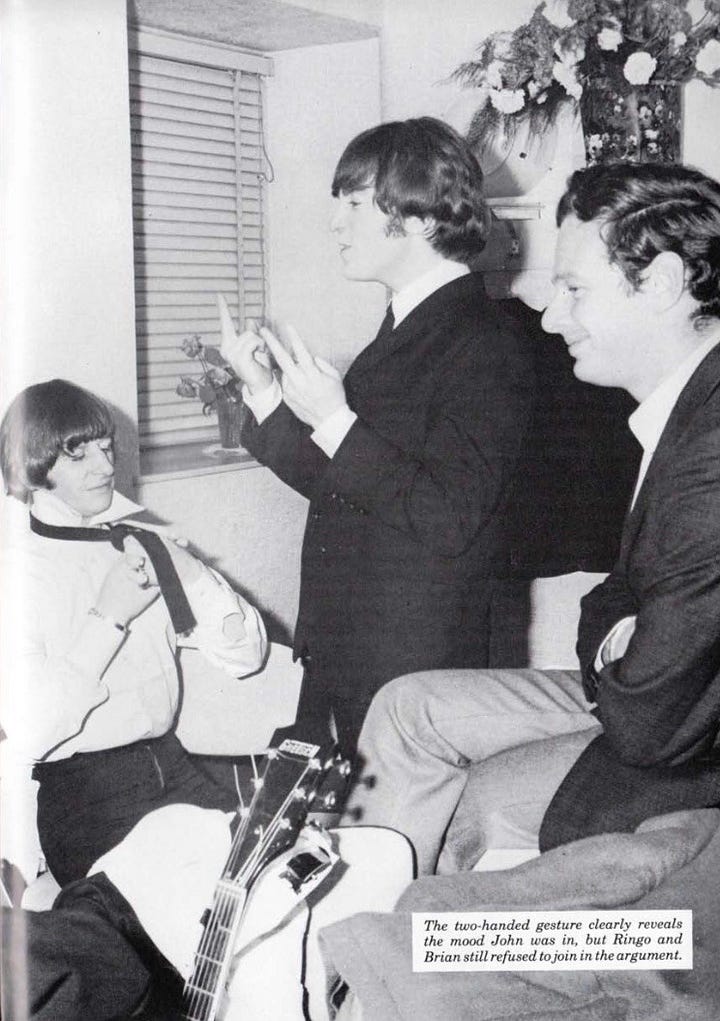
Later that night, standing solo in a single spotlight with the sting of John’s taunt still in his ears, Paul puts everything he has into his performance, arguably even overperforming it. He finishes to rapturous applause. John — obviously still in the grip of his insecurity-fueled jealousy — again steps on his musical soulmate’s moment of triumph. “That was wonderful, Ringo,” he quips as he presents Paul with a bouquet of flowers. Anyone who doubts the depth of John’s self-doubt should listen to his glee as he mocks Paul. Anyone who doubts Paul’s sensitivity to John’s barbs should watch his face when the bouquet is revealed to be a gag that falls apart in Paul’s hands. (yeah, they probably rehearsed that part, but we all know Paul’s not a good enough actor to control his involuntary facial expressions)
Capitol Records, the EMI subsidiary responsible for distributing the Beatles’ records in America and never one to take orders from its Limey colonialist parent company — isn’t this why we fought the revolution, after all? — releases “Yesterday” as a single in the US. EMI releases it everywhere else, other than the UK (where everyone already knows about it anyway because of Blackpool Night Out 🤔). It does about as well as you'd expect, which is to say very well, topping the charts for weeks around the world and selling well over a million copies in the US alone in the first month.
The cycle of insecurity continues its slow, escalating spiral through Revolver and Sgt. Pepper and The White Album and the Get Back sessions and Abbey Road, while “Yesterday” simmers quietly in the background, accumulating airplay and record sales and, most importantly, cover versions and their attendant songwriting royalties. It's not that other Lennon/McCartney songs aren't being covered. Of course they are, lots. It's just that "Yesterday" is being covered even more.
This won't go unnoticed by John, and so it's no accident that when his increasingly-volatile relationship with Paul finally implodes in 1971, John reaches for “Yesterday” as the killing blow in his poison pen song “How Do You Sleep?”
It very nearly is the killing blow. “All you ever did was Yesterday" is the line that shatters Paul to the point where he questions the very existence of his genius and drives him to make a mental — and given it’s Paul, probably an actual — list of every song he’s written, in an effort to prove to himself he didn’t somehow imagine the past ten years.
Thing is, even heartbroken heroin-fueled insecurity-crazed delusional gaslit YokoJohn knows he's lying out his arse with that line. The tragedy is that Paul doesn't.
In our most passionate, intimate and trusting relationships — the kind where we get naked, metaphorically or otherwise — with another person, each partner learns exactly which slings and arrows will destroy the other. In a devastating scorched-earth breakup, that knowledge is inevitably deployed in a desperate effort to deflect from one’s own nakedness on the way out the door.
You might have noticed we haven't talked about the actual song yet. That's because the actual song itself hasn't been directly relevant until this point in the story, when it becomes the most relevant thing of all.
By virtue of its title alone, the language of “Yesterday” sets it unambiguously in the past. Paul occasionally speculates half-heartedly about it being a “dead mother song,” but it's obvious he doesn't really believe this and nor should we. The suggestion that "Yesterday" is about the death of Paul’s mother is simplistic, heavy-handed freshman lit crit nonsense. The lyrics don’t support it and neither do the circumstances of its composition.
The pain in "Yesterday" is no ordinary pain, and it’s self-evidently not the uncomplicated pain of a well-loved child mourning a devoted parent who died of a terrible disease. “Yesterday” is the hollow shell-shocked lament of a grown man entering his dark night of the soul. And an artist can’t express that kind of pain as starkly and masterfully as “Yesterday” does without having lived it.
So how does a 22-year-old relatively sheltered young man from a stable, loving family, adored by the whole world, and who's never yet faced a dark night of the soul become so intimately acquainted with what it’s like to be on his knees alone in the middle of the night, begging for some kind of release from the agony his life has become?
He doesn’t.
Paul hasn’t lived that pain yet. But he will. Which is why it’s likely “Yesterday” isn’t a song about the past at all. That, in a bit of trademark subconscious McCartney wordplay, "yesterday" actually means tomorrow. That when Paul writes it in 1965, he's writing about a future he's trying desperately to forestall but fears he can't.
"Yesterday" is a hymn of prophecy.
That might sound mystical and if you ask me over a glass of wine, I’ll tell you I think it is. But it doesn't need to be.
When you know and love someone the way Paul and John knew and loved each other, you also know — even when you don’t “know” — what’s likely to end the relationship. It’s that subtle uneasy feeling we sometimes have, but rarely admit to, about how a love affair will end, even as we’re falling in love and don’t want to believe it will ever go wrong.
I think Paul writes "Yesterday" because a part of him — most likely a part he's not consciously aware of since he’s acknowledged he doesn’t know what the song is about and doesn’t recognise it as his when he dreams it — fears/knows that eventually the cycle of insecurity between himself and John will become a death spiral no matter how hard he works to prevent it. Part of him is already grieving the likelihood that he and John will not in fact be together when they’re sixty-four, as they’re both saying they expect to be.
It’s another one of those quiet things. Paul in 1965 isn’t going to admit this “out loud” to himself, but he is going to write a song about it, because that's what Paul McCartney does because that’s what artists do. The truth of an artist’s life is always found in their art, if the art is honest. And by definition, great art must be honest or it's not great art.
"Yesterday" is undeniably great art. It’s the ragged plea of a man stripped like the Biblical Job of everything, including his position and his pride, and exiled into the wilderness without a compass or a map, blindsided by a rejection he doesn't understand, hoping not for a release from the pain, which clearly isn’t expected, but for the dignity of an explanation for why he's being made to suffer it.
That’s an uncannily accurate description of Paul during the breakup, the brilliant beautiful golden child, so broken that he lacks the willingness to even get out of bed or bathe, drinking himself near to death in a no-name hovel in the Scottish backcountry, completely at a loss as to why he ended up there, while a bitter, anguished, drug-crazed John Lennon anoints himself Christ and rewrites the entire decade, including himself, the Beatles and Lennon/McCartney, as a sham and a lie.
All of this is more than enough to make “Yesterday” what it is, but there’s more. Great art rises above the personal to become bigger than itself and its creator, and that description of Paul and John during the breakup is also just about the best allegory I can think of for the collapse of the Love Revolution of the Sixties.
“Yesterday”’s deeper hold on us may well be that it’s become our collective song of mourning for that brief shimmering era that increasingly feels like the best chance we’ll ever have to get this whole “building a civilization in which we’re decent to each other” business right.
The Sixties, like the Beatles and Lennon/McCartney, burned bright but not long, sweeping in like the Second Coming and transforming us — or rather almost transforming us until we fucked it up — then kicking us out of the Psychedelic Garden of Paradise to wander, dazed and confused toward a slowly escalating dystopian future, forever incomplete in our regret, longing for one more chance to get it right before it all falls apart beyond saving.
The collapse of the Sixties, inextricably intertwined with the breakup of the Beatles, is a searing generational trauma, even for the generations that didn't live through it. It’s the archetypal Fisher King wound of a culture that’s bleeding out with no salvation anywhere in view. And if it's increasingly clear that the mortal wound can't be healed, that no one is coming to save us and that we’re incapable of saving ourselves, at least we'd like the courtesy of an explanation for what the hell we did wrong to fuck it all up so badly.
"Yesterday" is our cultural elegy, in two minutes and three seconds, for everything that could have been but won’t be. For John and Paul and The Beatles and the Sixties and its unkept promise of a better world. Pick up the bags, get in the limousine.
But on June 14, 1965, that’s all still in the future. Back at Abbey Road, the final notes of "Yesterday" absorb softly into the walls of Studio 2. Paul McCartney is 22 years old and brilliant and beautiful and he and John are madly in love with the music and with each other and their best work is still ahead of them and he’s just written and recorded a masterpiece and in this moment, with his bandmates... with John... beside him... he gets a fleeting, ephemeral moment to savour it, before it all falls into the sun.
Coda...
In 1980, in his last major interview, John will have this to say about “Yesterday” — “I have had so much accolade for ‘Yesterday.’ That’s Paul’s song and Paul’s baby. Well done. Beautiful.”
John's words are gracious and tender. They suggest the possibility that he might have managed to claim his soul at last, and let’s hope Paul has found some healing in them. But personal demons don’t give up so easily. Even in 1980 when he and Paul are in the midst of reconciling, John can’t... quite... leave it there. “And I never wished I’d written it.”
Three months later, whatever hope there was for a new beginning between them will be lost forever.
In the ‘90s, Linda McCartney will ask Yoko to agree to swap the credit order on “Yesterday” to "McCartney/Lennon as a birthday gift for Paul. Yoko will refuse. (and yes, yes, I know, don’t fuck with “Lennon/McCartney”. but still.) Things between Yoko and Paul will get ugly(er). John’s a secular saint. Paul’s a knight of the realm. "Yesterday" is a standard. And still the cycle of insecurity continues.
If there is a soft flare of hope at the core of this story, perhaps it’s this — whatever his undeniable genius, his extraordinary ability to rise from the ashes, his stubborn resolve to acc-en-tu-ate the positive, it seems clear that Paul McCartney, along with the rest of us and including (I like to believe, watching from somewhere) John... has never stopped longing for... and believing in... yesterday.
NOTE: This piece is the original inspiration for Beautiful Possibility. You can find its origin story here. And the episodes in sequence here.
Since writing this, I’ve come to see that it’s not actually true that there is no room for John in “Yesterday.” The truer perspective is, I think, here: The ‘entangled form” of Lennon/McCartney But what matters for this piece is that John believed that “Yesterday” was Paul’s and Paul’s only.



